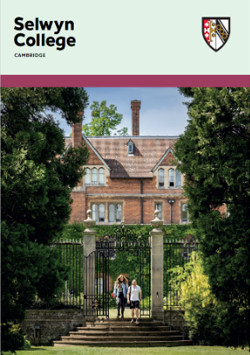The subject at Selwyn
The Teaching Fellows have a broad range of specialisations and will do most of the supervision teaching in the first two years of the course. They also do the individual direction of studies and organisation of supervisions. Supervisions are generally undertaken in pairs and on average each student has two or three College supervisions a week. We also have a small number of other supervisors who have long associations with Selwyn. A feature of Selwyn is that you will be assigned a Director of Studies (DoS) when you arrive and that DoS will continue with you for at least the first three years, thus providing time to get to know and understand you as an individual.
An important aspect of College life is that there is a good community of Engineers in the years above who can help with all aspects of the course, ranging from assistance with particular exercises to the selection of third- and fourth-year modules. There is also an active Selwyn Engineering Association that organises social events.
The Engineering Fellows
The Selwyn Engineers: Dr Carol Armitage, who supervises Materials, Professor Stewart Cant, Professor of Computational Engineering: Professor Daping Chu, Nanjing Professor of Technology and Innovation: he supervises Electrical Engineering. Professor John Dennis, Professor in Chemical Reaction Engineering. Mr James Matheson, Professor James Moultrie, University Senior Lecturer in Engineering Design: he is also Director of Studies for the Manufacturing Engineering Tripos and supervises Mechanics and Manufacturing Engineering; Dr Iman Tavakkolnia - Electrial Engineering; Dr Peter Wilkinson - who supervises structures; and Professor Chander Velu - Innovation and Economics).
Subject requirements
The Cambridge Engineering Tripos demands a high standard in Mathematics and a sound knowledge of Physics so both these subjects are essential. Further Mathematics is strongly encouraged and should be taken to A-Level if your school offers it. Common choices of a fourth A-level subject include Chemistry and Design and Technology. Economics or a modern language are other quite popular possibilities. Applicants who are studying IB should take Mathematics Analysis and Approaches.
Admissions Assessment - ESAT
As at other Colleges, applicants will be asked to take the ESAT (Engineering and Sciences Admissions Test). You must take the first sitting of the test. You must be registered in advance (separately to your UCAS application) to take the assessment. The test is taken at your local Pearson VUE test centre. Please see the UAT-UK website for full and further details.
Interviews
You will typically have one or two subject interview(s) of up to 30 minutes, with a pair of Engineering Fellows. The interview will aim to test your ability to reason logically and your mathematical ability and scientific understanding in an engineering context. We realise that it is a challenge to have to ‘think through’ problems under pressure so we do our best to make you feel as much at ease as possible – and provide hints if you run into difficulties, very much as we would for students in supervisions.
You will also have a shorter general interview with an Admissions Tutor. This interview is aimed at learning about your interests and activities outside Engineering and your motivation to study Engineering.
Before the interviews we suggest you find out as much as you can about engineering as a course of study and as a career. This not only helps confirm your choice of course in your own mind, it helps convince us of your motivation to study the subject and that you will enjoy and make the best use of the course here. Take every opportunity to go on work placements, enter project competitions, attend open days, and undertake courses, such as Headstart, and engage with practical engineering.
View on gap years
We welcome applications equally from those opting for direct entry and those wishing to take a gap year.
A gap year can have many advantages for you. A University requirement for successful completion of the Engineering Tripos is that four weeks of industrial experience must be obtained before the end of the second year and a further four weeks before the end of the third year. It is possible to gain all or part of this experience before starting the course, either through summer placements orduring a gap year. You can gain industrial experience and training through direct sponsorship or through the Year in Industry scheme, see http://www.etrust.org.uk/the-year-in-industry.
You can combine this with travel and possibly learning a foreign language. Further information about gap years can be found on the departmental web site, see http://www.admissions.eng.cam.ac.uk/information/gap-year.
July 2025


